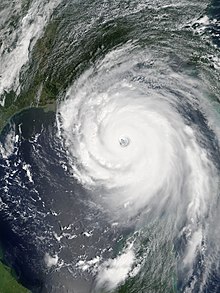
Back Orkaan Katrina Afrikaans إعصار كاترينا Arabic اعصار كاترينا ARZ Furacán Katrina AST Katrina qasırğası Azerbaijani Uragan Katrina BS Huracà Katrina Catalan Hurikán Katrina Czech Corwynt Katrina Welsh Orkanen Katrina Danish
This article contains several duplicated citations. The reason given is: DuplicateReferences detected: (November 2024)
|
 Katrina at peak intensity in the Gulf of Mexico on August 28 | |
| Meteorological history | |
|---|---|
| Formed | August 23, 2005 |
| Extratropical | August 30, 2005 |
| Dissipated | August 31, 2005 |
| Category 5 major hurricane | |
| 1-minute sustained (SSHWS/NWS) | |
| Highest winds | 175 mph (280 km/h) |
| Lowest pressure | 902 mbar (hPa); 26.64 inHg |
| Overall effects | |
| Fatalities | 1,392 total |
| Missing | 652 |
| Damage | $125 billion (2005 USD) (Tied as the costliest tropical cyclone on record) |
| Areas affected |
|
| IBTrACS | |
Part of the 2005 Atlantic hurricane season | |
| Hurricane Katrina |
|---|
 |
| 2005 Atlantic hurricane season |
| General |
| Impact |
| Relief |
| Analysis |
| External links |
|
Hurricane Katrina was a powerful and devastating tropical cyclone that caused 1,392 fatalities and damages estimated at $125 billion in late August 2005, particularly in the city of New Orleans and its surrounding area. It is tied with Hurricane Harvey as being the costliest tropical cyclone in the Atlantic basin. Katrina was the twelfth tropical cyclone, the fifth hurricane, and the third major hurricane of the 2005 Atlantic hurricane season. It was also the fourth-most intense Atlantic hurricane to make landfall in the contiguous United States, gauged by barometric pressure.
Katrina formed on August 23, 2005, with the merger of a tropical wave and the remnants of Tropical Depression Ten. Early the following day, the depression intensified into a tropical storm and headed generally westward toward Florida. On August 25, two hours before making landfall at Hallandale Beach, it strengthened into a hurricane. After briefly weakening to tropical storm strength over southern Florida, Katrina entered the Gulf of Mexico on August 26 and rapidly intensified. The storm strengthened into a Category 5 hurricane over the warm waters of the Gulf of Mexico before weakening to a high-end Category 3 hurricane at its second landfall on August 29 over southeast Louisiana and Mississippi.
The largest loss of life in Hurricane Katrina was due to flooding caused by engineering flaws in the flood protection system, particularly the levees around the city of New Orleans. 80% of the city, as well as large areas in neighboring parishes, were flooded for weeks. The flooding destroyed most of New Orleans's transportation and communication facilities, leaving tens of thousands of people who did or could not evacuate the city before landfall with little access to food, shelter, and other necessities. The disaster in New Orleans prompted a massive national and international response effort, including federal, local, and private rescue operations to evacuate those displaced from the city in the following weeks. After the storm, multiple investigations concluded that the U.S. Army Corps of Engineers, which had designed and built the region's levees decades earlier, was responsible for the failure of the flood-control systems. However, federal courts later ruled that the Corps could not be held financially liable due to sovereign immunity in the Flood Control Act of 1928.
The emergency response from federal, state, and local governments was widely criticized, leading to the resignation of Federal Emergency Management Agency (FEMA) director Michael D. Brown and New Orleans Police Department (NOPD) Superintendent Eddie Compass. Many other government officials faced criticism for their responses, especially New Orleans Mayor Ray Nagin, Louisiana Governor Kathleen Blanco, and President George W. Bush. However, several agencies, such as the United States Coast Guard (USCG), National Hurricane Center (NHC), and National Weather Service (NWS), were commended for their actions, with the NHC being particularly praised for its accurate forecasts well in advance.[1] Katrina was the earliest 11th named storm on record before being surpassed by Tropical Storm Kyle on August 14, 2020. The destruction and loss of life caused by the storm prompted the name Katrina to be retired by the World Meteorological Organization in April 2006.
On January 4, 2023, the National Hurricane Center (NHC) updated the Katrina fatality data based on a report by Rappaport (2014) which reduced the number from an estimated 1,833 to 1,392.[2][3]
- ^ Cite error: The named reference
CongressInvestigationwas invoked but never defined (see the help page). - ^ Knabb, Richard D.; Rhome, Jamie R.; Brown, Daniel P. (January 4, 2023). ""Tropical Cyclone Report, Hurricane Katrina 23-30 August 2005" (PDF)" (PDF). NOAA.GOV.
- ^ Schleifstein, Mark (January 14, 2023). ""How many people died in Hurricane Katrina? Toll reduce 17 years later"". The New Orleans Advocate.